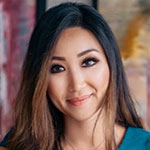Rebecca Yeng
Rebecca Yeng (IMC16)
Marketing Manager for E-Commerce at The Kraft Heinz Company

Rebecca Yeng (IMC16) started her career in advertising on the agency side in project management. After noticing how the use of data was becoming so prevalent in the industry, Yeng decided she needed to go back to school to improve her analytical skills. She chose Medill because of its reputation as a top school and because of the strengths that the IMC program offered in both brand management and in analytics.
During Medill's Immersion Quarter, Yeng worked with Restaurant Brands International out of Miami, Florida. After graduation, she landed a job offer at The Kellogg Company, which she credits in part to the skills and experience she learned during Immersion Quarter.
As a category manager at Kellogg’s, she managed the snacks business for specialty channels and worked on iconic brands such as Pringles and Cheez-It. After two years at Kellogg’s, Yeng was recruited by Kraft Heinz and offered the job she now holds as a marketing manager for e-commerce.
What are your main responsibilities at The Kraft Heinz Company?
I am responsible for growing Kraft Heinz brands in various e-commerce channels including Amazon, Walmart grocery pick-up, Walmart.com, Kroger.com, Instacart and Peapod. I work with vendors such as Nielsen, IRI, Numerator and Mintel to generate e-commerce-specific categories and shopper insights.
Additionally, I identify threats and opportunities and develop recommendations to drive the business forward. My role involves cross-functional collaboration, meaning I work with the sales, media and brand teams to align our marketing strategies. Finally, I manage agency partners for online displays and campaigns.
How did the Medill IMC program prepare you for your job?
The analytics classes IMC offers really prepared me to take on a marketing role in the consumer packaged goods (CPG) world. Any marketing role in a CPG company requires you to understand and analyze data to come up with strategic recommendations. The courses at Medill really prepared me to think analytically and use data to tell a compelling story. At the end of the day, marketing is all about selling and nothing makes a selling story more convincing than incorporating lots of great data.
Immersion Quarter gave me a great opportunity to use what I learned in class in a real-world business setting. I was among the first few students to go to Restaurant Brands International. It was an intense but very rewarding experience. The project given to my team was challenging and we faced many difficulties in bringing the project to life. Fortunately, we had great mentors from Medill and my team was so dedicated to delivering the best results we could. The outcome was beyond amazing. The company decided to take our recommendations and execute them. It was my very first experience working in a corporate environment and I learned that you could be very good at your job, but equally important, you need to know how to work with people, especially from different levels in a big corporation.
Did this Immersion Quarter experience help you in your job search?
Not only did I get a big corporate name on my resume, which always helps when it comes to searching for jobs, but the project we worked on provided me with knowledge and experience in dealing with real-world business problems and solutions that hiring managers can relate to. These experiences made great stories to tell during interviews.
How do you apply the IMC way of thinking that uses both art and science in your job?
My job is all about combining art and science, knowing how to use different types of research and data, dig deep and connect the dots to find meaningful insights. At the same time, you need to be creative in your thinking in knowing how to use the data to tell a compelling story to convince your stakeholders to drive the business forward. That is the true value. Otherwise, data is nothing but a bunch of numbers.
What is a class or experience that sticks out in your mind and why?
I would have to say Statistics (now called Marketing Research). It was definitely one of the more challenging classes. I loved and hated it at the same time, but the knowledge I gained from the class was invaluable. Coming from a non-quantitative background, it really helped me to gain a strong foundation in using quantitative methods to solve real-world business problems. All of my classmates would come together and study as a group for that class and, from that, we were able to bond and have since become lifelong friends.

